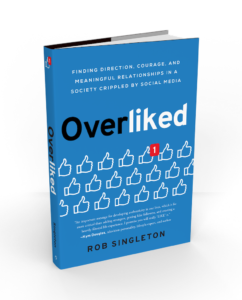“If you don’t have anything nice to say, then don’t say anything at all.” I think most of us have heard or been told that more than once in our lives. Sometimes, though, it’s much easier said than done, isn’t it?
There are times when we are faced with a situation where we just really want to give someone a real piece of our mind. It could be a family member, a friend, a co-worker, or a “friend” online, and in these moments, it’s easy to want to tell that person off. For as good as it might feel in the moment, it’s not how God would want us to respond. Staying calm and being slow to anger are what we are told to do, no matter how hard it may be.
Ephesians 4:32 says, “Instead, be kind to each other, tender-hearted, forgiving one another, just as God through Christ has forgiven you.” It’s not just kindness for the sake of kindness. And it’s not advocating selective tolerance. It’s God’s Word telling us to be kind in the ultimate way leading to the ultimate kindness—the kind that forgives. The kind that overlooks mistakes and misspeaks because we are all fallen creatures. And the kind that speaks truth and calls out the things in others that keep them from a change of heart and coming to Jesus.
As usual with God’s Word, there’s a lot more in there than meets the eye.
I’ve been thinking a lot about this lately as our culture, on the one hand, continues its hypocritical advance toward favoring optics over substance, and on the other hand, calls out trivia while ignoring terror.
In my lifetime, I’d never seen this whole train wreck on greater duplicitous display than with the constant attacks on a former president of the United States for his tweets, muffed phrases, name-calling, and yes, sometimes flat-out mean and inconsiderate words. While that part wasn’t new or even shocking—the ignoring of any honest evaluation of the good he did was so thorough—it was fascinating in a morbid kind of way.
And it was such an appealing bandwagon that I often found myself climbing aboard. Until one day, I pulled away from all the upfront spokespeople from either side and looked at the issues and platforms of each party. I then compared them to the Bible, and a real awakening took place for me. The more polished political party wasn’t always lining up as much as the foot-in-mouth party was.
Getting Beyond the Curated, Optics-Driven Surface
Too many people today are only looking at or listening to headlines, edited videos, fake avatars, or carefully scripted talking points. From these, they take their cues, live their lives, and accept whatever narratives are offered from top to bottom. Rare is the innocence and boldness of the child in the old fable who is willing to step forward—away from the herd—and call things as they really are.

Just the same, I needed to stop obsessing exclusively about whether or not the former president’s tweets were too insensitive or not PC-approved and just pray for him as I had done for every other previous president in my lifetime. (The Bible commands in 1 Timothy 2:1–4, “I urge, then, first of all, that petitions, prayers, intercession and thanksgiving be made for all people—for kings and all those in authority, that we may live peaceful and quiet lives in all godliness and holiness. This is good, and pleases God our Savior, who wants all people to be saved and to come to a knowledge of the truth.”).
I also listened carefully for the truth. The real, unfiltered truth. The kind that sometimes hurts—but only in the sense that it indicates what needs to be addressed.
Also, by laser-focusing only on what the former president said or how he said it, we ran the risk of concentrating on the game of hopscotch we’d set up on a busy freeway right before rush hour rather than the approaching vehicles sure to kill us. This kind of naive trivial focus might very well have taken our attention off of what things radical militant groups were actually doing behind the facade of a polished, eloquent, and extremely effective presentation. On the surface, the words may have looked appealing, and the optics may have sounded great, but what was really at the heart of it?
To be fair, we see this optical game being played on both sides—the same optics can be used for different narratives. For example, in the news, we’ve seen the imagery of tens of thousands of people marching peacefully as their hearts break, and they long to see justice for all—not just some—people. But we’ve also seen, at other times, images of burning and looting, shouting and fighting, minus all that peaceful stuff. Over on the other side of the fence, we’ve seen patriots and people genuinely proud of our nation, marching peacefully, while a fringe group of them break away and overwhelm the Capitol. Which is it? Are they patriots or pariahs?
Dig for the Truth
If we’re repeatedly presented with only one of these narratives and not the other, that affects the optics. The negative imagery presents a completely different narrative and, a person could argue, one that is intentionally made to scare or omit any of the good in a situation. On the flip side of this is a narrative that is focused only on the good, never showing a dark side or devastating events that could be happening in real life. It’s an OPTICal illusion on purpose.

Either way—if you only get one or the other—this only breeds more division between people. Depending on what they see, which narrative they’re following, nothing is solved, and nothing is changing because they’re just following the optics without getting to what’s beneath.
This is why so many people can align themselves with the surface optics of movements, positions, or protests without necessarily knowing what these are all about.
Solving this problem starts with awareness, and I hope this has opened your eyes—even just a little—to how optics play out in social media. If you want to learn more about getting beyond the optics to find the truth, grab a copy of my upcoming book, Overliked: Finding Direction, Courage, and Meaningful Relationships in a Society Crippled by Social Media. I take a deep look into the problem of optics—which has roots going back to Biblical times—and offer practical tips to, not only regaining a healthy relationship with social media, but experiencing the fulfilling life God created you to live. (I’ve got some pretty cool FREE GIFTS for pre-ordering too!)
Until next time, focus on Jesus and find your peace in Him.
~Pastor Rob
Aka P-Ro
